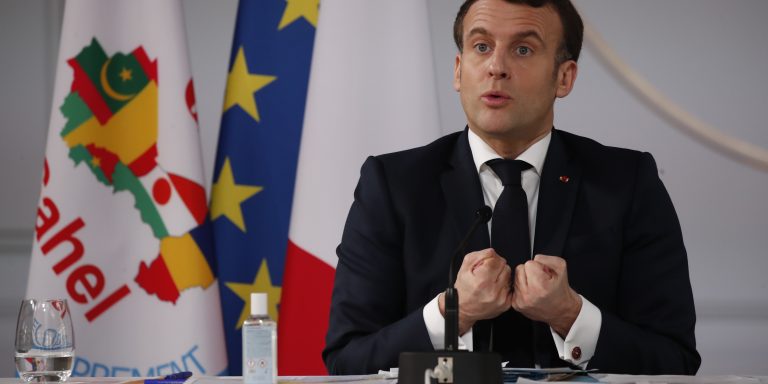INTELBRIEF
June 24, 2021
IntelBrief: As France Draws Down in the Sahel, How Will it Impact Regional Stability?

Bottom Line Up Front
- France is ending Operation Barkhane, shifting its counterterrorism posture in West Africa and attempting to devise a new approach in the Sahel.
- Without robust Western counterterrorism assistance, large swaths of West Africa could end up being controlled by al-Qaeda and ISIS affiliates.
- The U.S. is unlikely to commit significantly more resources to the Sahel, or anywhere else, unless there is a clear connection to great power competition.
- Fewer French counterterrorism assets place a greater onus on African troops and UN missions, although what replaces Barkhane still remains unclear.
France is drawing down its counterterrorism presence, Operation Barkhane, in West Africa’s Sahel region. This was formalized in a recent speech by French President Emmanuel Macron, who noted that Paris would still maintain a presence, though not on the scale of the 5,100 troops currently deployed across the region. The operation is aimed at providing security cooperation assistance and building partner capacity programs in Mali, Niger, and Burkina Faso. Moreover, it has allowed the United Nations mission in Mali to steer clear of counterterrorism and focus instead on more traditional peace operations functions. But the deployment has been growing more unpopular in France, the region’s former colonial power, forcing Macron to make the move ahead of a presidential election next year. Following an upsurge in attacks, including those resulting in the deaths of French soldiers, there has been a fundamental reassessment of costs and benefits associated with the mission. Ending Operation Barkhane could be an attempt to avoid mission creep; redefine France’s strategy in the Sahel; and pressure Paris’s allies to contribute more manpower and resources to the fight, in the face of continued United States reluctance to fund the G5 Sahel force.
The announcement came just days after the second military coup in Mali in less than a year. As a result, France suspended joint operations with the Malian military, prompting fears of a jihadist surge throughout the Sahel. Plagued by fragile states with porous borders and high levels of corruption, Sahelian leaders have struggled to put down a growing regional insurgency. Without robust Western counterterrorism assistance, large swaths of West Africa could end up being controlled by al-Qaeda and ISIS affiliates. Spillover violence has impacted Burkina Faso and the Ivory Coast as jihadists ramp up attacks against both regional security forces and civilians. French troops, stationed in Mali since 2013, have been viewed as a key bulwark in the ongoing fight against jihadist groups affiliated with both al-Qaeda and the so-called Islamic State. Many of these groups, including Jama'at Nasr al-Islam wal Muslimin (JNIM), Islamic State West Africa Province (ISWAP), and Islamic State Greater Sahara (ISGS), are gaining strength throughout the Sahel and other parts of Africa. Of the ten countries with the most significant increase in terrorist attacks last year, seven were in sub-Saharan Africa.
Macron’s decision to transition away from Operation Barkhane and replace it with a new operation came after lengthy discussions with French allies, including the United States and other European countries. But with the U.S. announcing a troop withdrawal from Afghanistan by September, it is unlikely that Washington will look to significantly enhance its military presence in the Sahel—or anywhere else for that matter—unless it is directly related to great power competition. The U.S. currently maintains roughly 1,100 troops in the Sahel, most of whom are focused on training, intelligence operations, and logistical support. Commenting on the complex challenges in the region, U.S. Secretary of State Antony Blinken recently noted, “instability and violence are symptoms of a crisis of state legitimacy,” going on to outline issues such as social grievances, a lack of accessible public services, and the exclusion of minority or marginalized communities from politics, and how these factors attenuate governmental legitimacy.
Fewer Western counterterrorism assets mean a greater onus placed on African troops and possibly UN peacekeepers, although it remains unclear exactly what will replace Operation Barkhane. The UN has maintained a significant presence in the region, most notably through the United Nations Multidimensional Integrated Stabilization Mission in Mali (MINUSMA) and various UN Country and Regional teams. With Operation Barkhane assuming the counterterrorism mandate, MINUSMA has been able to steer clear of counterterrorism activities, and Security Council members have repeatedly expressed reservations about including countering terrorism as part of the Mission’s mandate. However, the question isn’t simply about whether or not the UN Mission can itself undertake counterterrorism missions; there remain questions about if and how the UN can engage in situations or countries where terrorist actors are part of the security landscape, and there is little consistent guidance or doctrine across the UN system on this point. The urgency of these challenges will be amplified against the background of Operation Barkhane’s drawdown.
A recently formed task force known as Takuba, organized by France and consisting of other European countries, including Sweden, Italy, and Denmark, will fill part of the void working to train and advise African counterterrorism forces. France is promoting an initiative with the help of Niger and Kenya, two African countries that are also currently non-permanent members of the UN Security Council, to back efforts to expand the current UN support mission beyond Mali. The G5 Sahel—comprised of Burkina Faso, Chad, Mali, Mauritania, and Niger—has had an inconsistent human rights record in its counterterrorism campaign in the region, and struggled to secure funding and operational support. The counterterrorism coalition received a blow in April after the death of Chadian President Idriss Déby, who was a strong proponent of fighting jihadist groups.